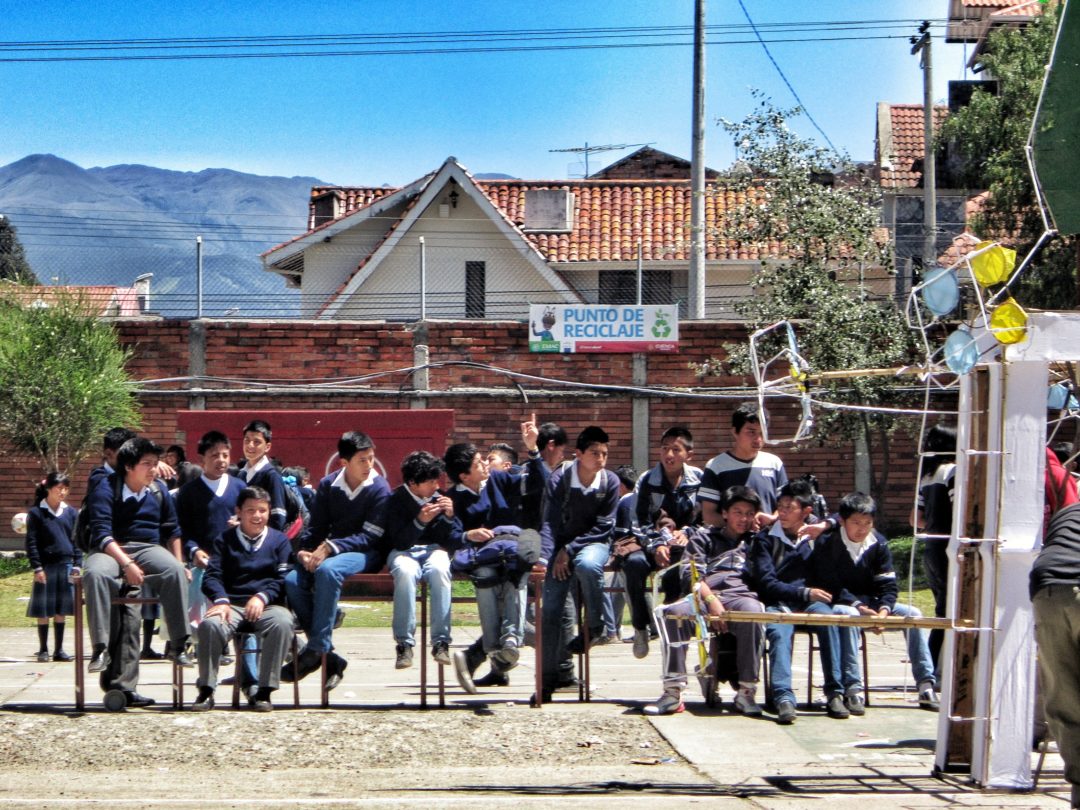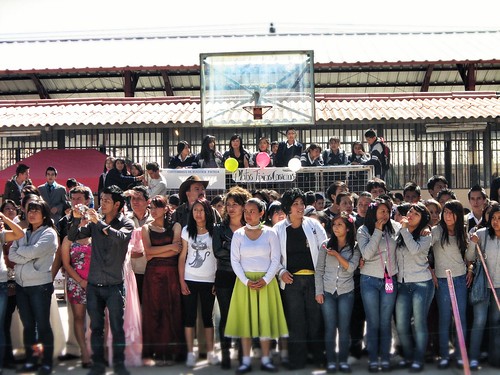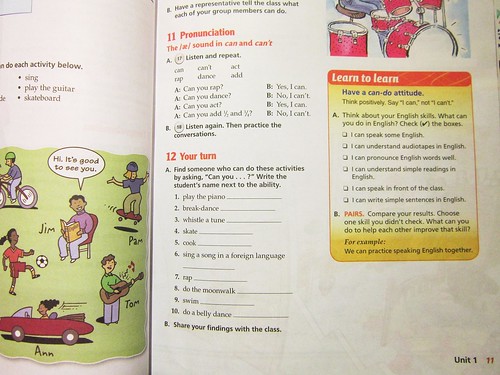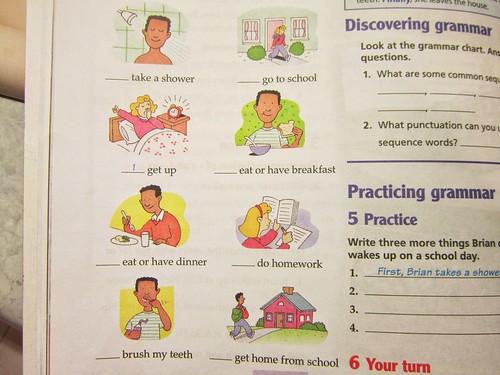“¿Tres ensaladas de frutas, por favor?”
I leave the tiny serving hatch, where three women wearing hair nets and harried expressions rush back and forth. Plates of food scattered around the kitchen are ferried to the multitude of teenage hands reaching through the bars at a speed my eyes can’t even keep up with.
Heading over to our regular table, I drop down into a chair with a sigh.
“I just had the Year 8s again. Pablo…he’s impossible!”
Sam shakes his head.
“I literally can’t believe what I used to put my teachers through. You know the most annoying kid in each of your classes? That’s what I was like at school. Except worse.”
It’s not a bad idea, really. Got an impossible pupil? Send him off to another country and tell him to teach. It’ll shake the belligerence right out of him.
Teaching changes your attitude
Anyone who thinks teaching is a piece of cake can think again. Before I arrived in Ecuador, the most teaching experience I’d had was a month of English conversation classes in Kathmandu and a few days at a Thai village school. I hadn’t gained much teaching experience in either of these places – and yet both had instilled in me a sense that I might actually be good at teaching.
Then I walked into my first classroom of Ecuadorian teenagers at Colegio de Miguel Merchan, and realised I knew absolutely nothing.
Turns out that my prior experience had given me ideas on how to behave at the front of a classroom – the confidence levels and the vocal volume – but not much about the knowledge I had to actually impart. And here in Cuenca I wasn’t just winging it for a couple of weeks. I was working every morning for four months: two hundred hours, in total.
So why hadn’t I learned how to be a teacher earlier? Well. In Nepal I taught primary school kids, who were mostly too shy to even speak in my classroom, let alone talk back to me. In Thailand, the village children were heartbreakingly excited to have three days with me talking away at the front of their class – I felt like a celebrity more than a teacher.
But from the first sarcastic stream of Spanish that erupted at the back of my classroom and caused a chorus of giggles, I quickly realised that I was going to have to develop a thick skin and a matching attitude to cope with my Cuencan students.
Because while I almost expected these teenagers to appreciate an English volunteer helping them out with their language skills, in reality it was somewhat the opposite. They do want to learn (I think) but its not cool to look like you’re keen in front of your peers. And so they talk, they laugh, and they often try to make me look like I don’t know what I’m doing.
This behaviour means I’ve had to actively change my attitude, to a point where even my voice sounds different in my head. I’ve become much more authoritative, more focused, and as my words echo round the room I can see my students’ faces absorbing what I say.
Sometimes, anyway.
There are still moments of confusion – when I rush through a lesson a bit too quickly, and it’s clear the kids don’t have a clue.
Teaching makes you over-analyse your resources
When I taught English in Nepal and Thailand I had no resources to work with. My Nepali headmaster pointed at his head to indicate where I was supposed to garner my teaching material from, and in Nong Weang we made up songs and ran around the classroom to try and attempt some kind of lesson.
In both placements, I always lusted after a non-existent textbook.
But being presented with the Holy Grail of teaching gear at Miguel Merchan hasn’t been the easy ride I’d hoped. The reason? Sometimes textbooks are more of a hindrance than a help.
The Ecuadorian-government-issued textbook initially made me assume my students should have an English skill level significantly higher than they actually do. Reading a descriptive passage out loud three times and realising they understood none of it? A bit of an issue. And I’ve discovered multiple usage of slang words that aren’t just inappropriate for beginners, but also barely utilised nowadays.
The grass is always greener, really. Because much as I appreciate having a guided, text-based lesson plan to follow, sticking completely to the book has led me into some serious linguistic difficulties. Like having to explain what on earth Brian in the red shirt is talking about when he says “better hurry”. A totally understandable phrase for English beginners…
It’s also quite sad, as it means that ultimately they’re going to go through the entire textbook with only a tenuous grasp of the English language; particularly when the teachers aren’t fluent either, so can’t necessarily correct mistakes. Some of which are integral to language learning – the difference between “I wash my face”, “you wash your face” and “she washes her face” for example.
Of course, I’m still not a trained teacher, so it’s nigh on impossible trying to explain exactly why the third person conjugation of a verb is always different to the rest of the verb’s conjugations. I’m still not even sure that ‘conjugation’ is the right word. Because while I’m a fluent English speaker, that doesn’t mean I actually know the correct ways to impart said skill!
So I get angry with the textbook (even though I’d never stop using it) because a lot of the time all it’s achieving is further confusion. When I’m marking homework, I come across mistakes like these:
“I wake up at 6:45 o’clock”
“I eat or have breakfast coffee and milk”
“I comb or brush my hair”
“I comb or brush my teeth”
So I have to spend another lesson explaining that, while the book demonstrates these sentences as correct, in fact there’s a bit more to it. And while I’m doing this, I wonder if they’re ever actually going to understand.
Teaching simplifies your language
The positive thing about realising that my students barely even know the basics of English is that it’s allowed me to really strip down and simplify the way I speak to them. Which, in essence, is the only way you really can learn a language. Baby steps. It’s also something that you need to experience firsthand in order to change your attitude.
When I was in Nepal, I thought I’d accurately gauged what English my nine and ten year old students knew. I thought I could write up a ‘simple’ conversation on the board, and we could practice repetition, and I’d impart some knowledge.
Browsing my old iPod notes the other day, I found the questions and answers that I wrote out.
Looking at this now actually makes me cringe.
Questions using two tenses with recommended answers only in the past? A multitude of vocabulary and different verbs for them to trip over? What the hell was I thinking?!
Obviously, that class in Nepal was a disaster. I could barely get my students pronouncing the words properly, let alone understanding their meaning. The problem is, a great deal of voluntary English teachers could easily make the same mistakes. Without trained teaching skills, it’s hard to understand just how slowly and simply beginner’s English needs to be taught.
Teaching gives you faith in children
But for all the lamentations about their lack of skill, I still get the occasional surprise that renders me speechless. Like Henry Ramon, a teenager who asked me what the differences were between the words ‘watch, look and see’ – a question the group of Ecuadorian English teachers had also asked.
Like Edison, who wears rasta beads, has a hand tattoo and took photos of his class notes on a mobile phone so he could cheat in a test. Wrong, certainly, but still serious out-of-the-box thinking! Like Estefanía, whose English is so good that she sits at the front of the classroom and patiently whispers the right pronunciation to those left grasping for words.
And like Pablo, the problem kid in the corner, who I spent four months despairing over. In my last week of classes he came to the front to do a presentation. And spoke in perfect English.
Teaching makes you re-evaluate yourself
But most of all, my four months of teaching in Ecuador, all two hundred hours of class time, have taught me something I wasn’t expecting.
I don’t think I’m cut out for teaching.
It’s strange: I have many of the qualities of a good teacher. I speak slowly and clearly, I engage with my students, I have the right demeanour to stand at the front of a classroom and impart knowledge. And when they get things right, it really makes me happy; like I’ve accomplished something.
What I don’t have, though, is the passion required for such a career. And I’m pretty sure that, if I stuck with it, I’d eventually get found out.
It’s a sad realisation to make; not just because it’s a great way to combine travel and work, but also because I know plenty of people who’ve absolutely adored teaching English overseas. I thought I’d be one of them.
But of course, there’s no reason why I should be a good teacher. There’s nothing to say that I’m required to enjoy such a career; and there’s also plenty of people I know who could never have handled even my four month teaching stint in Ecuador.
So for the time being at least,I won’t be chasing volunteer placements that primarily involve teaching. While I do enjoy it, there’s not enough pulling me towards the role. And while I have no doubt I’ll be teaching English again soon, I’m going to put my volunteering abilities in something different.
First up? Helping out my cousin in São Bento, Brasil, with her newly-established healing community, in the mountains just outside of Rio de Janeiro. Unless I find myself volunteering somewhere in Colombia first. My friend Adam suggested a great little organisation in Medellin, and I’ve just discovered a great project to volunteer in Rio’s favelas with. So many options…















35 Comments
Sam
July 12, 2013 at 3:14 amTake heart: conjugation is the right word!
Wow. I empathise with you so much, and can totally relate to this story! I am a trained teacher (at least trained in EFL), but still I’ve encountered many of these problems. Don’t get me started on textbooks…but yes, I’ll continue to use them, because, well, I don’t have time to create a whole new syllabus myself!
Having Henry ask the difference between ‘watch, look and see’; that must’ve been a great moment! It’s so satisfying when your students are asking the right questions like that!
And I actually think it’s great that this experience has helped you realise teaching is not for you. There’s nothing worse for the students than a teacher who doesn’t really want to be there. So good for you!
Flora
July 26, 2013 at 10:54 pmThank god! I was racking my brains for a different word for ages :p I feel your pain on the syllabus issue – it’s a vicious circle because much as I get annoyed with it, I know there’s no way I could create anything better..
This Battered Suitcase
July 12, 2013 at 3:26 amWhat a great article, Flora. I’ve taught English – both volunteer and paid work – for a decade now, and in a few different countries. My longest stint was in Japan for two years. I was lucky enough to secure a really great position in a company – I was one of only 15 who got to teach the really advanced adult learners, so my classes could often be focused on really interesting topics. I even ended up writing textbooks for the company, but as they were advanced, I thankfully didn’t have to write about the difference between combing one’s hair and combing one’s teeth. I even got to teach a literature class – we read Harry Potter!
Even though on paper our experiences teaching English were quite different, I agree with all of the points you made here. It was the most amazing thing to see how much my students improved throughout the year; it really did give me faith in people’s determination, and also inspired me to learn more myself. I think one of the best things a person teaching a language can do is try to learn a language themselves – it really helps put things in perspective.
Another lesson I garnered from teaching English was, well, to learn more about English itself! My students knew SO much more than me in terms of technicality and the actual “rules” of the language. They’d laugh at me, because I constantly repeated two phrases…for example, returning to the comb/brush situation, if they asked me WHY that was, I’d often just wave my hands in the air and say, “Crazzzzzzzzy English!” It’s true, English is one of the craziest/most difficult/non-sensical languages out there, and sometimes there is absolutely no rhyme or reason why we say the things we do (idioms classes were always a hoot). The other phrase I’d repeat was, “You know WHY, I know HOW. Let’s teach each other about English.” I discovered that many Japanese students, in their younger years, had to spend hours memorizing grammar rules and vocabulary, but spent very little time actually utilizing that knowledge in conversation. We’d collaborate together on lessons and end up having wonderful, gramatically-correct, two-hour-long debates and discussions on everything from whaling to feminism to green travel. Yes, I had the best job in the world. WHY DID I QUIT??
I’ll end my huge rant here to say, once again, I really enjoyed this piece, and all English teachers should read it. And don’t beat yourself up for not adoring teaching as much as you wanted to – I personally don’t like teaching teenagers at all, so good for you for sticking it out for a month! -Brenna
Flora
July 26, 2013 at 10:56 pmWhy exactly DID you quit?! Sounds like you absolutely adored it.. But I definitely understand the need to take a break from it now and again. Ultimately the part I most enjoyed was when the atmosphere was less ‘teacher-pupil’ and more idea sharing – which you clearly loved too 🙂 Great to hear people share the same sentiments as me!
jessi
July 12, 2013 at 2:56 pmGreat article, very insightful and true to what experiences will be like abroad. I taught English in Spain for a year fresh out of college and my experience was the same — I knew how to behave in front of a class, but not much about INSTRUCTING.
Now that I’ve got an MA in Linguistics and TESOL, I know what to expect – especially from textbooks. (even advanced speaking students can be beginners or low intermediate in writing, btw) This last year teaching has been much better and I get positive reviews from my students. I’ve still got a lot to learn, but I’m confident I’m doing my job well. 🙂
I’m sure, especially as a volunteer, you were very appreciated, even if it wasn’t always obvious bc of difficult students. It only takes a few to make your time worth it 🙂
Flora
July 26, 2013 at 10:58 pmYou’re right Jessi – it’s all about instructing. Sounds like you’re doing a much better job than I did!
Intrepidelle
July 15, 2013 at 8:46 amWhat an amazing post, Flora! I’ve never taught English abroad, mainly because I don’t have the TEFL or anything similar, and I’ve always suspected that teaching couldn’t possibly be as easy as most organizations make it out to be. If it was, learning foreign languages ought to be a whole lot easier! And English is so hard to explain… even as a native speaker, when people on the street ask me why certain words or certain grammatical tenses function the way they do, I struggle to come up with something more satisfying than “they just do”. It’s one thing to speak the language; another thing to rationalize it!
As always, you’ve put it perfectly. All of the best in your future volunteering endeavors!
Flora
July 26, 2013 at 11:16 pmThanks so much, I’m glad you enjoyed it! I think I’d still like to give TEFL a go at some point in the future, but I’m really glad I discovered that it’s not the right thing for me to be doing at the moment. Rational decision sorted!
Ryan
July 18, 2013 at 6:17 amFlora, you’ve enlightened me and partially prepared me mentally for what NOT to expect teaching English abroad to be. I am moving to Thailand this fall and I will be attempting to pick up teaching English somewhere in the region.
I do have a passion for teaching. While at Apple, I taught classes for 8 year olds in summer camps using Apple tech, to 80+ year olds on how to use Apple tech. Each taught me an immense amount of patience. Hopefully this will help.
I also learned a little bit about not necessarily teaching, but making a concept tangible to the individual. Now, technology and language are worlds apart, but I hope dome of the skills can translate!
If you have any advice, please reach out =)
Flora
July 26, 2013 at 11:22 pmPassion is the most important part! And patience goes a long way too 🙂 I’ll have a think about what to advise but I’m pretty sure you’re going to be absolutely fine Ryan – I can’t wait to read about your experiences teaching out there!
Victoria
July 20, 2013 at 2:16 pmOoooh, a healing community. What kind? I look forward to hearing about that 🙂
Flora
July 26, 2013 at 11:24 pmI’m not totally sure – she’s only had the place up and running for a few months! But rest assured there’ll be a lot of writing about it 🙂
Amanda Kendle
July 24, 2013 at 12:12 pmGreat post Flora and lots of honesty about the realities of teaching English! I started off teaching in Japan and thank goodness it was there – while I was fumbling my way through to figure out how the heck English actually worked (yeah, being a native speaker didn’t seem to help!) my students were so polite they never noticed! After that I got better at it and loved it and ended up teaching for ten years in four countries (now I still teach, but only adults, and stuff other than ESL). But it is definitely not for everyone. Still a great way to travel around though.
Flora
July 26, 2013 at 11:27 pmWow, ten years is quite a stretch – you must have adored it! Although it’s certainly not for everyone, there’s such a temptation to try it – particularly for long-term travellers – that I think a lot of people end up having the same kind of experiences as I did.
Jon Stark
July 25, 2013 at 4:33 amGreat post.
Having just quit teaching after 36 years each…. that’s about 86 000 hours…. just a few more than your 200, we found that it never got easier. Teaching is always a challenge, very rewarding, but it’s sure a relief to be done. We taught in Australia, Canada, Japan and China, including 3 years of ESL. Now we just travel the world.
Cheers,’
Jon and Jenny
Flora
July 26, 2013 at 11:29 pmOh, just a couple more hours than me then! Sounds like an incredible set of experiences to enjoy together 🙂
Liz
August 2, 2013 at 1:40 pmI have briefly thought a number of times about teaching English abroad, it’s nice to get an honest look at what really goes on. My mom was a teacher, so I certainly know how really difficult (and rewarding) it can be.
Flora
August 4, 2013 at 3:04 amI’m sure you saw all the good and the bad from your mum’s perspective!
Susanna
August 14, 2013 at 7:39 pmSaw this blog post and just had to comment!
I’m a trainee teacher in the UK and have just got back from 6 weeks in Nepal – wow was teaching there a shock! I absolutely loved the experience (I definitely have the passion for teaching at home), but it was the hardest teaching experience I’ve had yet.
The textbook issue rings so true to me as well… I WAS TEACHING ENGLISH FROM A BOOK WITH INCORRECT ENGLISH… does that not bother the Nepali government who wrote and published the book?? Loved what you said about those problems that are just difficult to explain and get your head around, such ‘I went to home’ being incorrect but ‘I went to hospital’ being correct. Poor kids! The point about the children not wanting to show their friends they like to learn, that is so true wherever you go… anyone who says ‘awh the children must be so lovely and love to learn English’ – try it yourself first! So nice to hear somebody else had these issues and challenges too!
Thoroughly enjoyed your post, I really did!
Susanna x x
Flora
August 19, 2013 at 3:54 amSusan, it’s great to hear that real teachers have the same kind of issues – I still feel guilty for not being properly in love with the profession. It’s also great to hear that your Nepali school had a textbook, something I was definitely not provided with when I was in Kathmandu!! But yes, the spelling errors were an absolute nightmare of a discovery. I hope you’re still loving your teacher training though! Well done for sticking with it 🙂
Bronwyn
September 3, 2013 at 5:15 pmI taught English for almost 10 months here in Mexico City and while I loved having interesting conversations with advanced students, teaching the mechanics of grammar could be a drag. I love writing and I love grammar and I love languages but I didn’t feel 100% passionate about teaching. Like you, that kind of mystifies me. I think partly I’m an introvert so it takes a lot of my energy. Partly, teaching kids who just didn’t care was draining. Also, most of my students needed English for work or school — no one was learning it for the love of the language. Whatever the case, like you said, it was still a rewarding experience. Congrats on doing a great job!
Flora
September 6, 2013 at 1:13 pmThat’s the thing – at the moment I’ve found such a love for learning Spanish, so I can imagine my various Spanish teachers haven’t found it that exhausting to teach me! (In all honesty they probably hate it because I can never stop talking in the language during class!).
It’s really weird when all the components are there, like you said – a love of writing, grammar and language – but still no real, honest desire to teach. Perhaps it’s just not the most optimum time for either of us to be teaching?! But serious congrats for sticking it out for ten months. There must be something in it that you love really!
Tanya
September 4, 2013 at 4:28 pmYou are commendably honest Flora, I enjoyed the read. I used to feel the same about that job (now I think the same of pretty much any permanent one).
Flora
September 6, 2013 at 1:11 pmI reckon I could end up with the same opinion :p It’s really useful to readdress how you feel about these kind of positions though; for a long time I was pretending to myself that I enjoyed the role, but in reality… and I think you really need to be passionate about being a teacher, otherwise your lack of enthusiasm translates to the students and you end up with the worst environment to learn in!
Working in a Bolivian Artificial Limb Clinic
October 26, 2013 at 4:43 pm[…] in, and the most removed from any skill set I possess – but after working with children and teaching English all over the world, I thought it was time to change things up a […]
TeacherKick » Blog Archive » The Benefits of Teaching Abroad To Find Work At Home
December 14, 2013 at 12:08 am[…] Philosopher Galileo Galilei famously said that “You cannot teach a man anything, you can only help him find it within himself.” With that in mind, let’s not forget that teachers can also be students and, if you’re thinking of going abroad but are not quite sure if it’s the right path for you, perhaps this article can inspire you to see the bigger picture of teaching in a new country. That being said, no one can teach you to do it, but you can be given the wings to fly to a land where going on a new adventure is possible. Because that’s what teaching abroad is – an adventure. […]
Rohan Limbu
May 20, 2014 at 10:44 pmYes ,this definitely is a problem in our Education system right now.”Reading a descriptive passage out loud three times and realizing they understood none of it? A bit of an issue.” Hate to admit this that we have worst Education system in the world.
I do not have good English and i guess that was the reason why . And what made worse is i was never taught by the volunteers like you . 🙂
Flora
June 2, 2014 at 4:30 pmI don’t think the education system in Nepal is the worst in the world, but some of my teaching in Kathmandu was certainly a challenge :p
Teacher Training UK
September 26, 2014 at 1:03 pmThis is a very motivational article for all the aspirants of teacher training in UK they will actually feel quite happy after reading the whole so thank you for posting it on their behalf.
Prime 25 Journey Blogs: 2015 Viator Journey Awards | Posts
December 26, 2014 at 3:31 pm[…] posts about what it is advisable to know earlier than volunteering with children abroad and about lessons she has learned while teaching English abroad are should-reads for anybody considering of doing […]
Sou Fudao 搜辅导
February 13, 2015 at 8:24 amSounds like you have been to some really cool places and had experiences that some only dream of. I like your positive attitude and shout out to the kids because after all you are there to help them succeed. Would love to see Nepal and Ecuador – cheers..!
Flora
February 13, 2015 at 1:40 pmThanks Sou 🙂 I’d definitely recommend both countries, they’re fantastic places to travel through!
The Pueblo of Morado K'asa and Its Two Hundred Residents
February 2, 2016 at 11:07 am[…] proactive with the situation, there was a deeper-set feeling that I couldn’t ignore. After five months of teaching in Ecuador, I simply wasn’t excited about taking up that position again. It was something like teaching […]
So You Want to Volunteer in South America?
February 11, 2016 at 9:51 am[…] from volunteering to teach English you could be a teaching assistant in a school or a daycare centre, work in an organisation that […]
10 Of Our Favourite Female Travel Bloggers - Ladies Trekking Club
April 1, 2017 at 10:10 am[…] Flora’s travel blog is something a little bit different from the rest on this list. She is not just a traveller but a volunteer too. Lots of her posts are on the fulfilling and much-needed act of volunteering, including her view on 200 hours of teaching English as a foreign language. […]